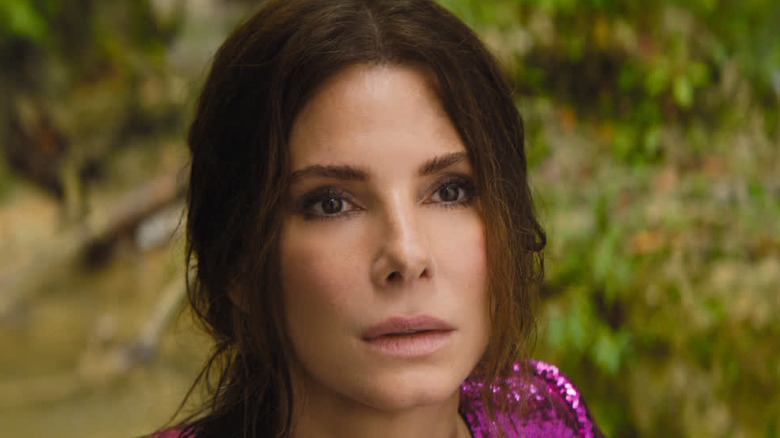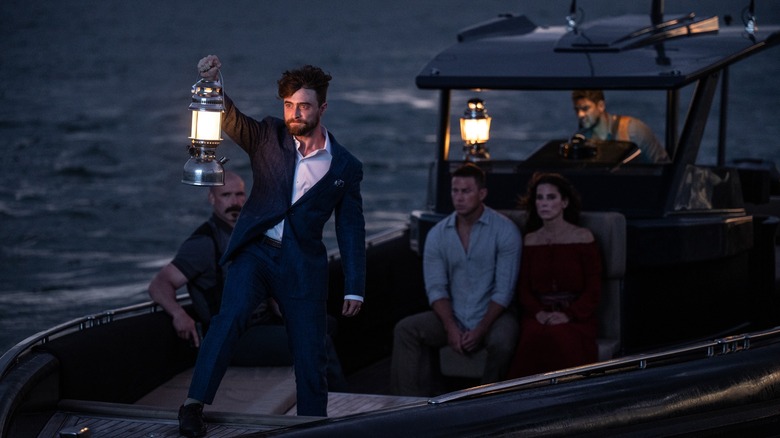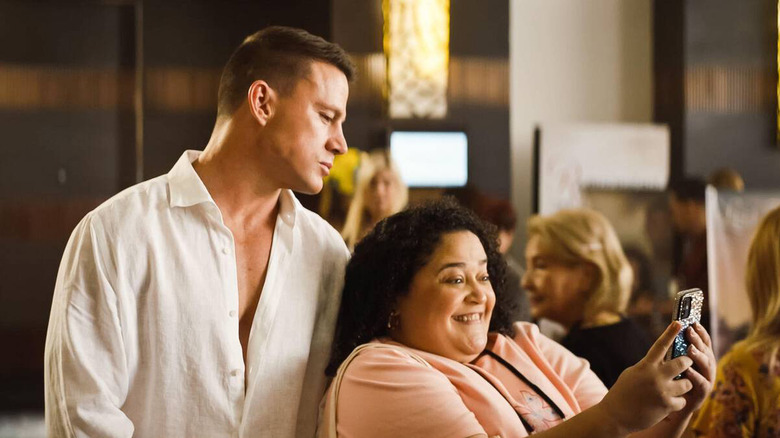The Lost City Review: Rom-Com Done Right
In a world where it's near impossible to get a mainstream studio comedy made if it's not also an action movie and doesn't feature Dwayne Johnson and/or Kevin Hart, "The Lost City" is a film that effortlessly brings back that early 2000s romcom energy. It ticks all the boxes necessary for the modern genre comedy, out-adventuring "Uncharted" with relative ease, but it harkens back to a seemingly bygone era with charm, verve and, most importantly of all, sincerity.
"The Lost City," on its surface, houses some big "Romancing the Stone"/"Jewel of the Nile" vibe, but skews closer to the effervescent aura of the pre-9/11 studio comedy than it does the screwball variety. There's still two "opposites attract" erstwhile lovers at the center, but their banter is leagues away from the lineage of "His Girl Friday" or other fast-talking repartee. It's a movie that operates on a level of overt absurdity without ever losing its earnest emotional core.
Sandra Bullock has been a pro for this sort of thing her entire career, and this is honestly the best she's been on screen since "Miss Congeniality," but her co-star Channing Tatum proves to be a delightful surprise. The "Magic Mike" films long ago proved he was a unique leading man, but "The Lost City" finds a way to let him present even more nuance than ever before, even playing such a broad and straightforward archetype.
It's honestly one of the most enjoyable theatrical releases of the year, thus far.
Looking for the D...
"The Lost City" follows Bullock as Loretta Sage, a famous romance novelist who has been in an insurmountable rut ever since the death of her husband. Her books follow a handsome and intelligent adventurer named Dash McMahon, the sort of Fabio-esque lunk you see on the covers of books for housewives in airports and grocery stores. But while the Loretta considers her work to be pretty schlocky, the love and passion from her marriage is what has always powered her prose.
Her latest book, "The Lost City of D," was cranked out feebly, at the behest of her manager and friend Beth (habitual scene stealer Da'Vine Joy Randolph), with a book tour co-headlined by Alan Caprison (Tatum), the cover model who has developed a cult following as if he actually were the real Dash. But seeing Alan, a man she thinks of as a hollow, vapid encapsulation of everything she hates about her writing career, leads her to want to retire the character altogether, telling fans she plans to kill him off.
But Alan, as dumb as he is, possesses more emotional intelligence than Loretta gives him credit for. He accurately clocks the true reason for her surliness and in trying to encourage her to get out of her funk, he ends up insulting her. In his regret, he longs to rectify the situation and hopefully find some way to prove to Loretta, a woman he clearly admires, that he's more than meets the eye. That she, ugh, shouldn't judge a book by its cover.
Lucky for him that Abigail Fairfax (Daniel Radcliffe), a megalomaniacal millionaire, kidnaps Loretta, planning to use her historical expertise to find the lost city and its treasure from her latest book. This both gives the movie a reason to exist, fertile ground to send up the genre Loretta herself writes, and provide Alan an opportunity to be the hero he has been taking photos as for years.
This being a comedy, the fact that he really possesses zero survival skills fuels the brunt of the second act's comedy. Alan may be in great shape, but he has no useful experience for an interactional rescue mission, necessitating the aid of Jack Trainer (Brad Pitt), a former Navy Seal Alan met on a retreat. What ensues is a movie that follows all the basic beats of a swashbuckling, treasure hunt adventure film, only ground up in a blender designed to reveal the inherent goofiness of that genre's many tropes.
But as hilarious as Pitt's extended cameo proves to be, as gonzo as Radcliffe's villain remains, or as many great laughs come from Randolph's work as Beth and the underrated Patti Harrison as Loretta's new social media manager, this is a real two-hander that hinges on the unique chemistry Bullock and Tatum possess together. The turns of the plot are effective and the callbacks in the comedic structure are well employed, but "The Lost City" lives or dies on the audience's ability to invest in this core romance.
Thankfully, the two leads deliver.
The Age of the Himbo
At its heart, "The Lost City" asks one very key question: what would happen if a self-professed sapiosexual fell for a himbo? Loretta is not, in her own mind, a woman easily impressed by chiseled good looks or the brand of charisma her readers fantasize her lead character to exude. Her late husband was a brilliant mind who had a boundless passion for exploring the unknown. Within her salacious scribblings, there's a through-line that is a true ode to their love for one another, whether she even realizes it or not.
So what could she possibly see in Alan, a man the film's many writers (both credited and uncredited) seem singularly devoted to present as perhaps the dumbest human being to ever live? Every subsequent scene shows Alan to be exponentially stupider, but they somehow never cross a line to where he becomes unbelievable — or worse, unlikable. Tatum imbues Alan with such warmth and sincere intention that the audience never really cares that he's dumber than a bag of bricks. It's okay that he looks like a male model but has the relative brain power of Homer Simpson, because his biggest strength is his heart and the touching way Tatum portrays him.
Bullock has always been great at delivering this kind of performance, where she's fiery, fed up and thrust into situations that allow her to flex her physical comedy chops. But this particular turn is so impressive for the omnipresent undercurrent of grief that seeps in between all the outbursts and all the comical flailing in the pink outfit she spends much of the film trapped in.
These two dueling approaches dovetail so perfectly in one of the film's key scenes, one that captures exactly what makes it so special. There's a moment late in the second act when Alan and Loretta are stuck in the jungle and camping out for the night. Alan is having an eczema breakout from the water they were hiding in and Loretta just used the topical oil he uses to treat it to start a fire for them. Loretta wisely retrieves a trio of face masks from Alan's bag and affixes them to his shirtless back, when he begins to muse how much this scenario feels like a parody of the ones within her books.
Loretta begins to "write" the scene in the tone of her purple prose, much to Alan's initial delight. But he finds himself swept up in her flowery language, even the phrasing he probably doesn't fully understand. In this moment, Alan's train of thought shifts from "what happens next?" to wondering if Loretta is really warming up to him. In a startling moment of vulnerability from Tatum, he comments on the amorous nature of Loretta's descriptions in mild, restrained disbelief. Here's this man who has been firmly established to be the literal dream of Loretta's not insignificant fanbase, and in this moment of raw sincerity, he doubts himself, absolutely convinced a woman this interesting could never find him desirable.
But Loretta, in spite of herself, is certainly beginning to, and it's not just because she gets to see his stripper body naked or out of desperation, but because she sees in Alan a kind of man she never could have written in her wildest imagination.
"The Lost City" earns its satisfying final moments. It's a hilarious and action-packed film that's maybe ten minutes too long, sure. But more importantly, it's a heartwarming and creative romance between two of Hollywood's most lovable movie stars. If it feels at times like magic, it's because its most striking moments aren't couched in irony or a detached self awareness, but in the tenderness of being truly known by someone, in the comfort and reassurance of finally being seen.


